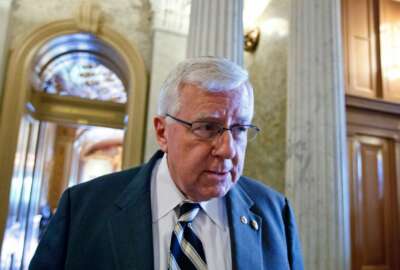

The Senate's budget resolution does not include reconciliation instructions to make cuts to the current federal retirement system.
The Senate narrowly passed on Thursday night a $4 trillion budget resolution for 2018 with a 51-49 vote.
Unlike the House resolution, the Senate’s version does not include reconciliation instructions that propose billions of dollars in cuts to the federal retirement system. The Senate’s vote this week sets the stage for both budget leaders in both chambers to conference over a concurrent budget resolution in the coming weeks.
The Trump administration applauded the resolution’s passage, which puts both the president and lawmakers one step closer toward enacting some sort of tax reform policy by the end of the year.
Yet pressure is mounting for the House to simply adopt the Senate budget plan to avoid potentially long negotiations over billions of dollars in proposed offsets.
Simply adopting the Senate plan would mean good news for federal employees, as the House resolution included “reconciliation instructions” to the House Oversight and Government Reform Committee to develop legislative proposals to reduce the federal deficit by $32 billion over 10 years through reforms to civil service pensions.
The recently-passed Senate resolution did include reconciliation instructions but to only two committees: the Finance Committee to develop legislative proposals for $1.5 trillion in “comprehensive tax reform” and the Energy and Natural Resources Committee to find $1 billion in deficit reductions.
The Senate version does not mention the Homeland Security and Governmental Affairs Committee, the group that has jurisdiction over the federal workforce.
Though the House resolution’s proposals were vague, potential changes would likely include higher employee contributions to the federal defined benefit pension plan, an elimination of supplemental payments to employees who retire before age 62 and a move to a defined contribution pension plan for new federal employees.
The House resolution also supported a proposal that would reduce the G fund’s rate of return in the Thrift Savings Plan. This isn’t the first time lawmakers have suggested such a proposal, and both the Federal Retirement Thrift Investment Board and federal employee groups have previously said the change would make the G fund practically worthless for TSP participants.
Though federal employees may avoid major changes to the federal retirement system through this year’s budget resolution process, Congress could enact similar cuts through other legislative vehicles.
Lawmakers could revive the G fund proposal to pay for other programs, as they have suggested in previous years.
Learn more about the complicated budget resolution process and the impact it may have on your retirement here.
The Senate Budget Committee’s report also includes some notable priorities that the chamber’s leaders have flagged.
Leadership on the Senate Homeland Security and Governmental Affairs Committee described their budgetary priorities in separate letters to Senate Budget Committee Chairman Mike Enzi (R-Wyo.) and Bernie Sanders (I-Vt.).
More closely aligning federal benefits to the private sector is a priority for Chairman Ron Johnson (R-Wis.) He suggested shifting the defined benefit pension to a defined contribution plan and using the highest-five years of salary average rather than the highest-three years for calculating retirement benefits.
He also recommended having all federal employees contribute 4.4 percent toward their pensions. Currently, only federal employees hired after 2013 contribute that much.
Johnson also suggested several current initiatives that Congress should de-prioritze. He called the Government Publishing Office’s functions “duplicative,” and said Congress could better spend the agency’s $117 million appropriation somewhere else.
The Homeland Security Department’s headquarters consolidation should also be a lower priority, Johnson said. He criticized the project’s $2 billion cost to date and the slow progress of the move itself. Only the Coast Guard has finished the move.
“Like any government agency, DHS has some programs that work better than others,” Johnson’s letter said. “Among the low performers is St. Elizabeths.”
Meanwhile, Senate Homeland Security and Governmental Affairs Ranking Member Claire McCaskill (D-Mo.) also suggested the National Background Investigations Bureau (NBIB), the Office of Personnel Management’s semi-autonomous agency that performs background check work, receive its own appropriation.
“The security clearance process requires a dedicated funding stream to ensure that clearances are being thoroughly and timely processed,” McCaskill wrote.
Copyright © 2025 Federal News Network. All rights reserved. This website is not intended for users located within the European Economic Area.
Nicole Ogrysko is a reporter for Federal News Network focusing on the federal workforce and federal pay and benefits.
Follow @nogryskoWFED

